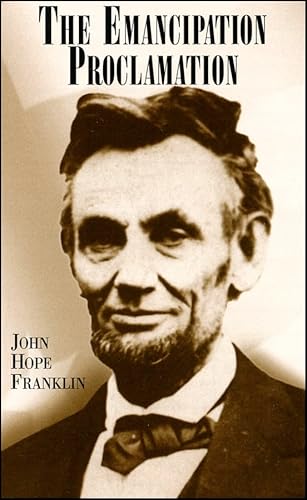The Emancipation Proclamation
John Hope Franklin
BOOK REVIEW

The Emancipation Proclamation is not just a pivotal document in American history; it's a bold declaration that reverberated through the souls of millions, a turning point that set ablaze the fight against the chains of slavery in the United States. Written by the esteemed historian John Hope Franklin, this work peels back the layers of a complex and transformative era, urging readers to confront the uncomfortable truths of our past. Here, Franklin intricately weaves narrative and analysis, compelling you to wrestle with the implications and legacies of this landmark proclamation.
In a mere 155 pages, Franklin doesn't shy away from the tumult of emotions tied to the Proclamation. From the fervent cries for freedom to the sobering realities of resistance, the text serves as a time capsule, encapsulating the hopes, fears, and aspirations of a nation on the brink. The Proclamation issued by President Abraham Lincoln on January 1, 1863, marked a watershed moment that would reshape the landscape of America forever. Franklin's incisive exploration goes beyond the basic facts, urging you to envision the weight of this decision on both the enslaved and their oppressors. It's not just history; it's an emotional reckoning that resonates deeply even today.
Franklin's scholarly prowess is complemented by his passion and commitment to social justice, drawing on a rich tapestry of historical context. As you read, you can almost feel the palpable tension in the air as African Americans seized the opportunity for liberation, joining the Union Army in droves, armed not just with weapons, but with an indomitable spirit yearning for dignity and recognition. The vibrant narrative portrays how this moment galvanized a collective consciousness, igniting a movement that would ultimately lead to the abolition of slavery and the reformation of societal norms.
But Franklin challenges us to see beyond the triumphs. The Proclamation, while a bold step toward freedom, was also fraught with limitations. It didn't free all enslaved people immediately or guarantee equality; it was a pragmatic wartime measure that reflected the complexities of Lincoln's own views on race. Franklin uncovers this paradox, forcing you to confront the uncomfortable alliance between freedom and pragmatism. The contradictions within this historic document echo in our modern discussions about racial identity, police brutality, and systemic injustice.
Perhaps the most gripping aspect of Franklin's work is how it confronts detractors and naysayers. While many laud the Proclamation as a monumental stride towards liberation, there are voices that criticize its efficacy. Some have wondered if it truly advanced the cause of freedom or merely served as a weapon in Lincoln's political arsenal. The discourse surrounding these varied perspectives enriches Franklin's narrative, demonstrating that history is rarely black and white.
The responses from readers resonate in unison; many express gratitude for Franklin's nuanced portrayal of a subject that is often oversimplified or romanticized. Yet, there are also critics who argue that his analysis could delve even deeper into the socio-political ramifications of the Proclamation beyond the battlefield. This dialogue between readers reflects the enduring relevance of the text, inspiring further exploration of America's unresolved racial tensions.
The Emancipation Proclamation compels you to engage with history not as a series of events, but as a living, breathing entity that demands our attention and reflection. It's a call to arms against ignorance, urging you to embrace the complexities of freedom and the sacrifices made in its pursuit. Every page turns like a flash of enlightenment, igniting the fires of empathy and understanding within you. You walk away not just with knowledge, but with a fervent desire to participate in the ongoing dialogue about race and identity in America.
If you've yet to immerse yourself in John Hope Franklin's insightful analysis, let these words linger; they are an invitation to grapple with the nuances of a profoundly significant moment in history. The rhythms of struggle and redemption echo throughout, inviting you to remember, reflect, and awaken the latent activist within. This is not a story simply told; it's a clarion call urging you to feel the weight of history upon your shoulders and to carry its lessons forward. 🌍✨️
📖 The Emancipation Proclamation
✍ by John Hope Franklin
🧾 155 pages
1994
#emancipation #proclamation #john #hope #franklin #JohnHopeFranklin